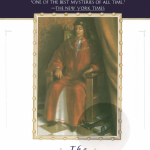The title of Caroline Stevermer’s A College of Magics makes it sound like yet another Harry Potter-inspired tale of gifted children, magical hijinks, and saving the world from He Whose Name In This Book We Do Not Yet Know, but in fact it is nothing of the kind.
The tale is set in an alternate Europe, toward the end of the 19th century. There are railroads, and automobiles are not unheard of, but there are no airplanes and the First World War is not yet even a dream. There is magic, clearly, but no “wizarding world” as such; wizards are simply few in number, and often only half-believed in.
The tale’s heroine is Faris Nallaneen, the young duchess of a small Ruritanian country named Galazon. Faris, who is several years from being of age, has been shuffled off to Greenlaw College in France by her scheming uncle Brinker, who has been running Galazon to his own benefit since Faris’ parent’s died. She has no desire to be at Greenlaw, but under the circumstances has little choice but to give in. She doesn’t have to take much interest in her classes (and no one seems to care whether she does or not); so she spends her time wandering about Greenlaw and reading in the library, especially reading books she thinks she might find helpful as duchess when she comes of age. (One of the delights of the book is Faris’ deep and abiding love for Galazon and its people.)
Greenlaw College, a women’s school, is one of two schools in Europe that teaches magic. (The other is Glasscastle, in England, which teaches only men.) It is on the coast of Normandy, and from the description it sits precisely where Mont St. Michel sits in our world: on an island, reached from the mainland by a causeway. Greenlaw is a far more subtle place than Hogwarts, with a distinct lack of sorting hats and stairways that move themselves. Indeed, it isn’t even obvious to Faris that any magic is actually taught there. There are the usual academic subjects of the trivium and the quadrivium, and of deportment (for this is a finishing school of sorts, as well as a school of magic). And yet the young women who graduate after three years are entitled to be called “Witches of Greenlaw,” and are highly sought after: one older classmate, for example, immediately finds work in the diplomatic service.
Faris arrives at Greenlaw on the same day as Menary Paganelle, the younger daughter of the King of Araville. Faris is short-tempered, and unwilling to work on anything she does not see the use of; Menary, on the other hand, is a beautiful, blond piece of work whose entrance into any seen spells trouble: exactly the sort of character I usually hate, the kind who can convince the powers that be that she’s as pure as the driven snow, but causes endless trouble for the protagonist—except that the powers that be are smarter than that, delightfully, and know a piece of work when they see one. Worse, Galazon and Araville are neighbors; Araville claims overlordship over Galazon, and Galazon regards the King of Araville to be a Duke who’s gotten rather above his station. Sparks are guaranteed to fly.
I was expecting this book to follow Faris all through her time at Greenlaw as she makes friends, learns magic (despite it not being taught, exactly), and grows up: your basic school-centric coming-of-age novel. And it is a coming of age novel of sorts…but to my surprise, only the first third of it takes place in Greenlaw. The rest takes place in Paris and Eastern Europe, and far more than the fate of the Duchy of Galazon is at stake (though not, again delightfully, the fate of the Whole World).
I first read this book a year or so ago, and recently read it to my kids (ages 16 down to 9) over the course of about a month. The book is almost five-hundred pages long, but all four of them were rapt from the first page. I’d categorize it as a classic young adult novel, i.e., there’s no sex with sparkly vampires or other dark erotic currents, and though it is made clear that Menary Paganelle is something of a libertine the wording is elliptical. (Which is to say that I’m sure my eldest understood it, and my youngest did not notice it).
On re-reading, I found A College of Magics to be a delight, pleasant, low-key, and as comfortable as an old-glove, the sort of book I might pick up on a rainy afternoon when I’m home with a cold and want to be happy for a while. Highly recommended.












